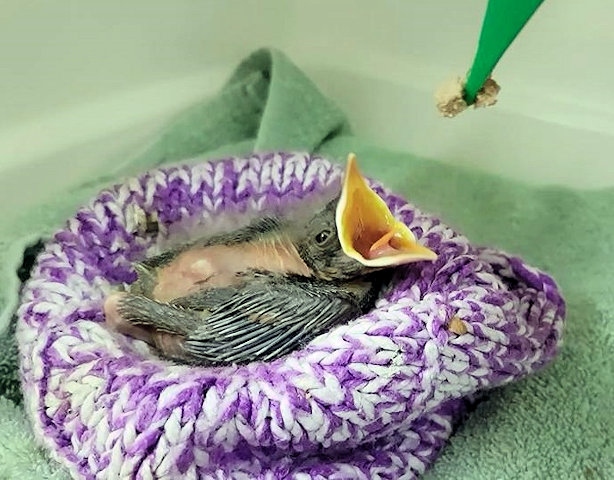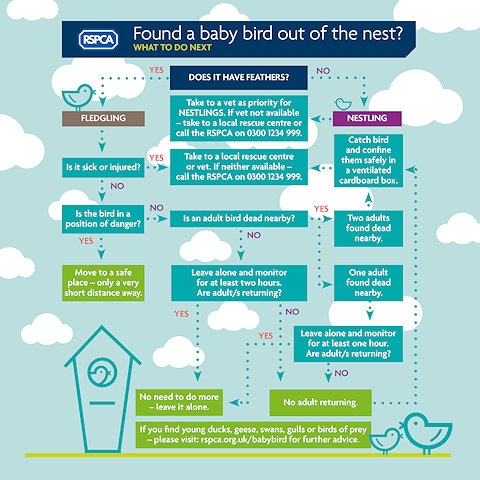1,240 calls from North West about baby birds last year prompts RSPCA advice this season
Date published: 05 May 2019

Photo: RSPCA
Blackbird - Nestling
With more than 1,240 calls last year from people in the North West concerned about baby birds found away from their nest, the RSPCA explains how to tell a nestling from a fledgling.
The animal charity has also prepared a helpful downloadable poster on what to do if you see a baby bird out of the nest.
In 2018, the animal charity received 9,163 reports from members of the public concerned that lone young birds they had spotted away from the nest needed help.
Most of last year’s calls (7,839) related to fledglings (older baby birds that are starting to fly), which the RSPCA advises can generally be left to be cared for by their parents. Since 2014, there has been an 80% rise in the number of fledglings that have been brought into the RSPCA’s centres.
The remaining 1,324 calls about young birds related to nestlings - the very young baby birds - who will not survive out of the nest. It is these that are more likely to need help.
But how can you tell the difference between a nestling and a fledgling?
In simple terms, nestlings have no feathers or very few. But most fledglings have all or most of their feathers and leave the nest just before they can fly. Unlike nestlings they can also perch, hop and walk.

During the annual baby bird boom at this time of year, the RSPCA’s wildlife centres care for over a thousand 'orphaned' fledglings each year, picked up by well-meaning people. But many of these birds are not orphans and are often better off if they are left in the wild. The animal charity has seen a 81% increase in the number of calls to collect fledglings over the past 5 years (from 3,835 in 2014 to 6,958 in 2018), so it is really important to ensure it is only those that really need help that are brought in.
If anyone spots a nestling, they need assistance and should be taken to a vet, a local rescue or they should call the RSPCA. Fledglings can usually be left alone but if a fledgling is injured or has been attacked or appears to be orphaned or separated from their parents, people should call the RSPCA for help.
The animal charity has produced a useful printable step-by-step guide explaining the types of situations where the babies of common garden birds might genuinely need helping, and when the young bird is purely exhibiting natural behaviour as part of its development, in which case it is usually better to leave well alone.
RSPCA’s Scientific Officer Evie Button says: “It’s wonderful that people want to do the best for our wildlife, but sometimes it’s difficult to know when to intervene and when to hold back.
“The first step is to identify whether the young bird is a nestling or fledgling. Nestlings are baby birds that have no feathers, or very few. Because they will not survive long outside the protection of the nest, these very young birds should be taken to a vet, or a local wildlife rehabilitator. If neither is available, the RSPCA’s emergency line can be reached on 0300 1234 999.
“We also provide advice on how to safely catch, handle and care for the nestling until it can be taken to an expert.
“Fledglings on the other hand have all or most of their feathers and leave the nest just before they can fly. Unlike nestlings they can also perch, hop and walk. If one is seen away from the nest, it should be left alone and watched from a distance for up to two hours to ensure the parents are returning. It is likely the parents are nearby and will still be feeding the bird.
“We advise never to try to return a bird to the nest as this may disturb the other young birds and may be illegal. If a fledgling is in immediate danger, it should be placed in a sheltered spot a short distance away.”
The RSPCA advises that there are exceptions to these rules.
For example, tawny owlets can climb back up into the nest, so if one is found under a possible nest site, the little bird should be monitored from a distance to see if the parents are nearby. If their call is heard, the young bird should be left alone.
If, after monitoring, the fledgling is genuinely orphaned, it should be taken it to a wildlife rehabilitator.
Other species, like gulls, ducks, swans, geese, swifts, swallows, house martins and birds of prey need to be dealt with on a case-by-case basis and we would advise anyone who has encountered young birds of these species in need of help, to call the RSPCA’s emergency line on 0300 1234 999, for further advice.
For more information, visit the RSPCA’s webpage ‘Found a Baby Bird’:
Concerns about animals should be reported via the RSPCA’s hotline on 0300 1234 999.

Do you have a story for us?
Let us know by emailing news@rochdaleonline.co.uk
All contact will be treated in confidence.
Most Viewed News Stories
- 1Rochdale born entrepreneur aims to take health platform stateside
- 2Toast of the town: Mayor of Rochdale celebrates 25 years at renowned bakery company
- 3Rochdale people could be charged for bins - and see a tax rise of 4.99% this year
- 4New chief executive appointed by Rochdale Council
- 5Castleton, Littleborough and Rochdale among stations to be served by Bee Network trains
To contact the Rochdale Online news desk, email news@rochdaleonline.co.uk or visit our news submission page.
To get the latest news on your desktop or mobile, follow Rochdale Online on Twitter and Facebook.

